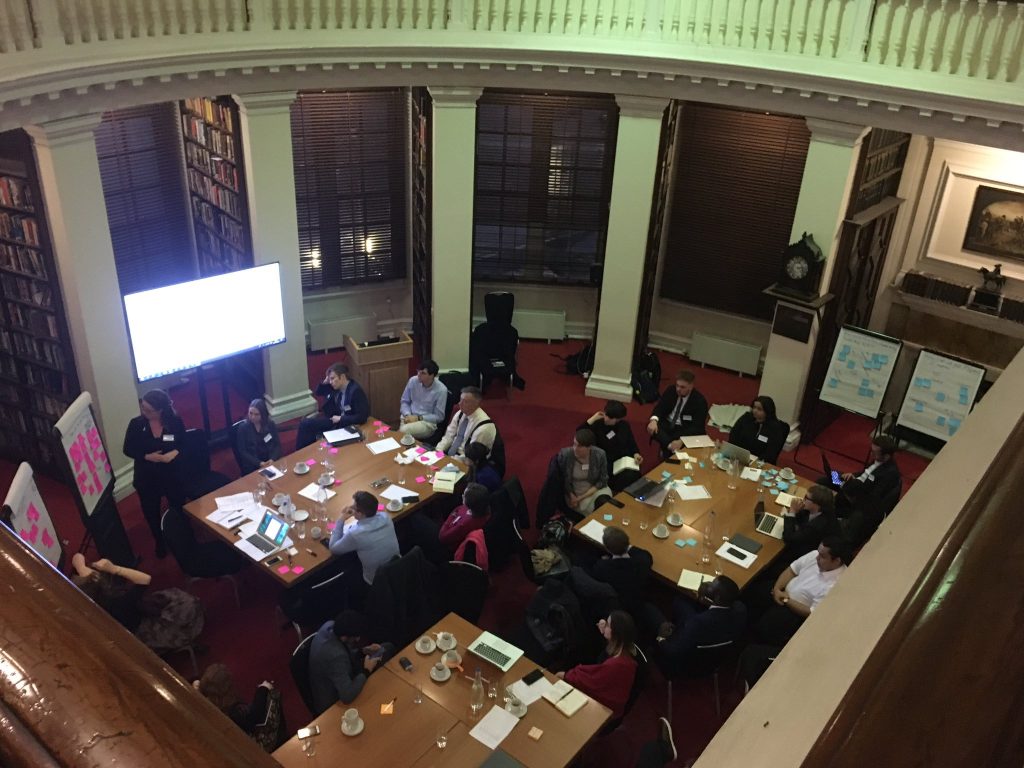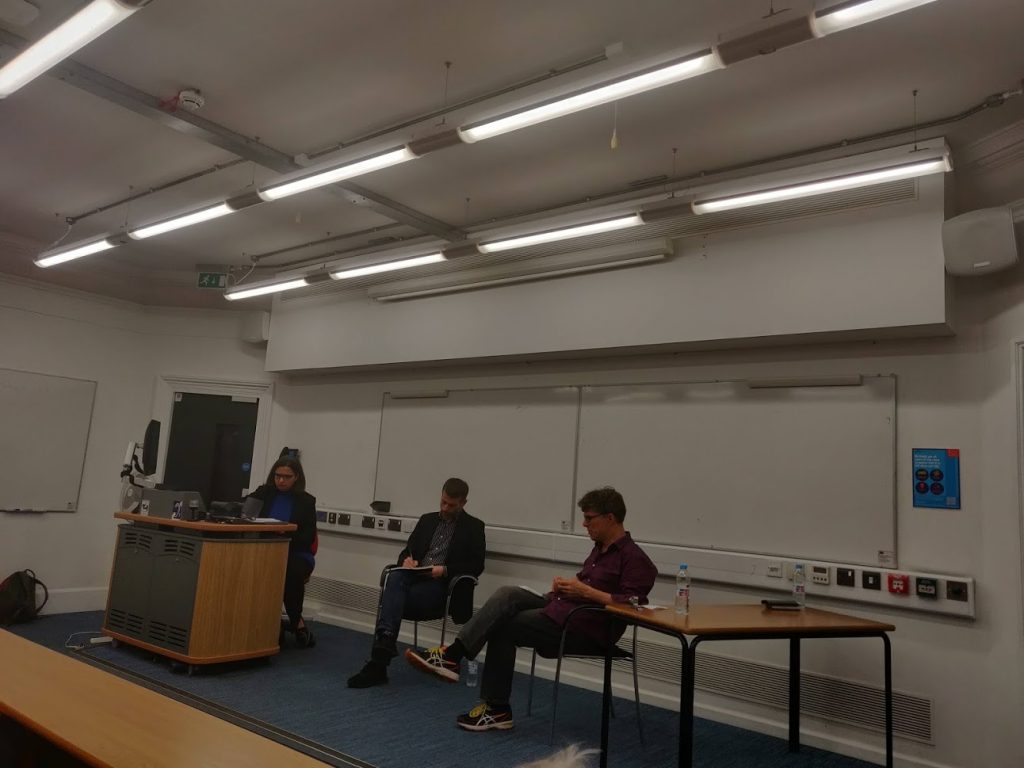by Orion Noda

In the last week of November 2019, London hosted three insightful events sharing an overarching theme: Nuclear Weapons. On 26 November, King’s College London’s (KCL) Centre for Science and Security Studies (CSSS) brought together three experts to discuss the future of the global nuclear order, ultimately posing the question: are we on the precipice of peril? The panel was chaired by Professor Wyn Bowen, head of KCL’s School of Security Studies, and it featured Dr Heather Williams (lecturer from the CSSS), Shatabhisha Shetty (Deputy Director of the European Leadership Network), and Marion Messmer (co-director of the British American Security Information Council, BASIC).
On 28 November, KCL teamed up with British Pugwash for a screening of the documentary “The Beginning of the End of Nuclear Weapons”, followed by a lively debate between Dr Lyndon Burford, a post-doctoral candidate at KCL and supporter of the Treaty on the Prohibition of Nuclear Weapons (TPNW), and Paul Ingram, Senior Fellow at BASIC and a friendly sceptic of the TPNW. The debate was chaired by Dr Salma Shaheen, from KCL’s Department of War Studies.
On 29 November, RUSI and BASIC co-organised a workshop entitled “Beyond 2020”, focusing on the expectations for the Non-Proliferation Treaty (NPT) Review Conference of 2020 and the overall future of the global nuclear order. The day-long event brought together young scholars, activists, and technicians to share their views on the future of non-proliferation and disarmament, and to propose ideas to make progress in the nuclear arena. Despite being focused on interactive group discussions, the workshop was kicked-off by expert briefings from Jamie Kwong (PhD candidate at the CSSS), Lord Hannay of Chiswick (GCMG), and Dr Dan Plesch (SOAS’s Centre of International Studies and Diplomacy).
Each event had its own specific scope, but all shared the same overarching theme: the future of nuclear weapons and arms control. On CSSS’s panel, it was interesting to see how each of the speakers brought avenues for discussion alternative to the NPT. Dr Williams mentioned the (surprisingly) US-led initiative “Creating an Environment for Nuclear Disarmament” (CEND), consisting of informal talks in order to overcome the technicalities that seem to dominate nuclear arms control talks and the NPT Review Conferences. The distinguishing feature of CEND is the fact that it includes States that are not usually at the table, such as Israel, India, and Pakistan – all non-signatories of the NPT.
Shatabhisha Shetty’s talk focused on the P5 process, an initiative based on transparency and confidence-building measures between its members. It seeks to create a more amicable environment between the involved parties to work on matters of non-proliferation, nuclear risks and disarmament. Despite a hiatus of two years (2017 and 2018), the P5 process returned to the agenda in 2019 due to an initiative from China. Currently, the scope of the P5 process is to further develop a glossary of terms, which would standardise the members’ understanding of nuclear terms. Yet, critics argue that the P5 process should focus on more pressing matters, and that the glossary of terms is merely a distraction or a waste of time. For instance, disarmament (one of the pillars of the NPT) has been stagnating for years, creating a sense of frustration from non-nuclear weapons states: if the P5 do not hold up their end of the bargain, why should non-nuclear weapons states hold theirs?
Marion Messmer talked about the progressive work that BASIC has been involved with, together with the Swedish Ministry of Foreign Affairs. The Stepping Stones approach seek to create small goals and milestones that, despite being short of the more ambitious and pressing goals of the NPT, already spurred some progress, however small.
Resonating with Marion’s talk, Paul Ingram’s scepticism over the TPNW stems from the hasty and untimely factors of its arrival. Despite being an activist and working towards a non-nuclear world, Ingram mentioned how the introduction of the TPNW at this stage might eclipse the NPT , which is already struggling. The argument is that by putting forward a legally binding treaty to ban nuclear weapons at a time when negotiations around arms control, disarmament, and non-proliferation are fragile might be overwhelming for nuclear weapons states. Instead, he argued that the way forward is through phases, and the Stepping Stones approach, which he has been involved with through his work at BASIC, is the most appropriate strategy.
In contrast to this argument, Dr Lyndon Burford believes that the TPNW does not tamper with the NPT. Both serve different purposes, and both should be proposed and get all the attention they can. Lyndon brought to the debate the necessity of involvement of non-State actors, such as technicians, activists, and the civil society in general. The 2017 Nobel Peace Prize to the International Campaign to Abolish Nuclear Weapons (ICAN) put anti-nuclear activism in the spotlight, creating a setting for further progress in the non-proliferation and disarmament agendas.
After being exposed to these insightful contributions and debates, RUSI and BASIC’s workshop was the perfect ending to this series of nuclear-related events. The workshop allowed conference participants to take initiative, voice concerns and propose solutions to the gloomy views on the future of nuclear arms control. The initial expert briefings by Jamie Kwong, Lord Hannay of Chiswich, and Dr Dan Plesch provided a well-rounded introduction to the debate, which presented a different topic from other featured events: the role of the UK in shaping the future of the global nuclear order.

Throughout the day, much was discussed in terms of our concerns and hopes regarding the future of nuclear arms control, the UK’s role in it, and ideas to move forward. A clear consensus amongst the groups was the deep concern over the development and integration of new technologies to nuclear weapons – particularly artificial intelligence (AI), echoing a point raised by Dr Williams in the CSSS event. Amongst these young leaders – ranging from Master students to teaching fellows, technical experts, policy analysts, and activists – the removal of the human component and integration of a raw and deeply flawed AI system to nuclear weapons is something that must be immediately addressed. Proposed ways for that included increased engagement from the public and raised awareness about the dangers of creating a real-life doomsday machine.
Much was discussed also about the UK’s role, as a member of the P5, in exercising active leadership in breaking the stalemate of nuclear arms control. Nevertheless, our the participants’ prospects are not the most optimistic, particularly after Lord Hannay of Chiswick brought to our attention the lack of a clear position on nuclear policy from the UK’s candidates. With the Review Conference taking place in April and May 2020just around the corner, whoever occupies 10 Downing Street will have limited time to prepare. Furthermore, the UK’s current political situation threatens its leadership status in contributing to the NPT goals: the withdrawal from the European Union would likely lead to an approximation with the US, putting in check the UK’s credibility in impartially leading nuclear disarmament talks. Nevertheless, the workshop also produced a few ideas of what the UK can do to promote the NPT goals. These included a ‘no first use’ declaration and categorisation of its nuclear capabilities as measures of last resort, and reinforced commitment (not only from the UK, but from all NPT parties) to the NPT and its goals, despite the unlikelihood of a consensus document being produced at the end of the Review Conference in 2020.
On the overall future of the global nuclear order, the participants had an interesting and much-needed discussion on the special status of nuclear weapons: why have the bans on other weapons of mass destruction achieved relative success compared to nuclear weapons? Why is there such a stigma on nuclear weapons? There is a dire need to analyse the symbolism behind nuclear weapons to understand what drives its politics. To move away from the perception of nuclear weapons as symbols of status, prestige, modernity, and civilisation is to move forward in the quest for diminishing – and eventually eliminating – States’ reliance on nuclear weapons. It is the next generation of leaders’ task to de-mythify nuclear weapons and to call them what they really are: inhumane harbingers of doom.
Orion is a doctoral researcher currently at the Department of War Studies – King’s College London. He joined the Department of War Studies in 2019, as part of the Joint PhD-programme between King’s College London and the University of São Paulo, his home institution. He holds an MA (Hons) in International Security from the University of Groningen and a BA in International Relations from the Pontifical Catholic University of Minas Gerais, with a period at the Sorbonne University – Paris XIII. You can follow him on Twitter @orionoda